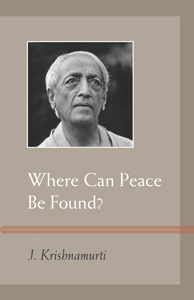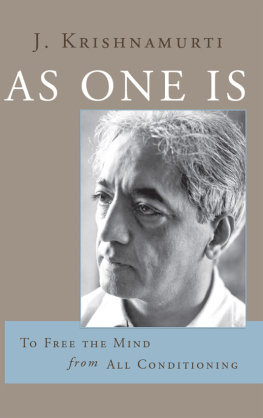Krishnamurti - On Learning and Knowledge
Here you can read online Krishnamurti - On Learning and Knowledge full text of the book (entire story) in english for free. Download pdf and epub, get meaning, cover and reviews about this ebook. publisher: Krishnamurti Foundation Trust, genre: Religion. Description of the work, (preface) as well as reviews are available. Best literature library LitArk.com created for fans of good reading and offers a wide selection of genres:
Romance novel
Science fiction
Adventure
Detective
Science
History
Home and family
Prose
Art
Politics
Computer
Non-fiction
Religion
Business
Children
Humor
Choose a favorite category and find really read worthwhile books. Enjoy immersion in the world of imagination, feel the emotions of the characters or learn something new for yourself, make an fascinating discovery.

- Book:On Learning and Knowledge
- Author:
- Publisher:Krishnamurti Foundation Trust
- Genre:
- Rating:4 / 5
- Favourites:Add to favourites
- Your mark:
- 80
- 1
- 2
- 3
- 4
- 5
On Learning and Knowledge: summary, description and annotation
We offer to read an annotation, description, summary or preface (depends on what the author of the book "On Learning and Knowledge" wrote himself). If you haven't found the necessary information about the book — write in the comments, we will try to find it.
On Learning and Knowledge — read online for free the complete book (whole text) full work
Below is the text of the book, divided by pages. System saving the place of the last page read, allows you to conveniently read the book "On Learning and Knowledge" online for free, without having to search again every time where you left off. Put a bookmark, and you can go to the page where you finished reading at any time.
Font size:
Interval:
Bookmark:
On Learning and Knowledge
Copyright 1994 by Krishnamurti Foundation Trust Ltd and Krishnamurti Foundation of America
On Learning and Knowledge
J. Krishnamurti
Krishnamurti Foundation Trust Ltd
The ascent of man does not lie in accumulated knowledge.... Scientists and others have said man can only evolve by having more and more knowledge, climbing, ascending. But knowledge is always the past; and if there is no freedom from the past, his ascent will be always limited. It will always be confined to a particular pattern. We are saying there is a different way of learning, which is to see comprehensively, wholly, holistically the whole movement of knowledge. Knowledge is necessary; otherwise you couldnt live, but the very understanding of its limitation is to have insight into its whole movement. We have taken knowledge as natural, and live with knowledge, and go on functioning with knowledge for the rest of our life, but we have never asked what knowledge itself is, and what its relationship is to freedom, what its relationship is to what is actually happening. We have taken all this for granted. Thats part of our education and conditioning.
Ojai, 15 Apri1 1979
Contents
Foreword
J IDDU K RISHNAMURTI was born in India in 1895 and, at the age of thirteen, taken up by the Theosophical Society, which considered him to be the vehicle for the world teacher whose advent it had been proclaiming. Krishnamurti was soon to emerge as a powerful, uncompromising, and unclassifiable teacher, whose talks and writings were not linked to any specific religion and were neither of the East nor the West but for the whole world. Firmly repudiating the messianic image, in 1929 he dramatically dissolved the large and monied organization that had been built around him and declared truth to be a pathless land, which could not be approached by any formalized religion, philosophy, or sect.
For the rest of his life he insistently rejected the guru status that others tried to foist upon him. He continued to attract large audiences throughout the world but claimed no authority, wanted no disciples, and spoke always as one individual to another. At the core of his teaching was the realization that fundamental changes in society can be brought about only by a transformation of individual consciousness. The need for self-knowledge and an understanding of the restrictive, separative influences of religious and nationalistic conditionings was constantly stressed. Krishnamurti pointed always to the urgent need for openness, for that vast space in the brain in which there is unimaginable energy. This seems to have been the wellspring of his own creativity and the key to his catalytic impact on such a wide variety of people.
Krishnamurti continued to speak all over the world until he died in 1986 at the age of ninety. His talks and dialogues, journals and letters have been preserved in over sixty books and hundreds of recordings. From that vast body of teachings this series of theme books has been compiled. Each book focuses on an issue that has particular relevance to and urgency in our daily lives.
Madras, 22 October 1958
Our problem is the mind, the mind which is conditioned, which is shaped, which is the plaything of every influence, every culture, the mind which is the result of the past, burdened with innumerable memories, experiences. How is such a mind to free itself from all this and be a total individual? I say it is possible only when there is serious, earnest study of oneselfthe self not being the atman or some so-called higher self, because those again are just words. I am talking of the self of everyday existence, the self that gets angry, the self that is ambitious, that gets hurt, that wants to be seen, that is very keen, that says, I must be secure, I must consider my position, and so on. That is the only self we have. The higher self, the super-atman, is only an ideology, a concept, an unreality; and it is no good going after unreality, for that leads to delusion. I know all the sacred books talk about the super-atman, whatever that is, and for the man who is caught in the daily self it is a marvellous escape. The more he speculates, the more he writes about it, the more religious he thinks he is. But I say that if you can go into the self that we all know, the self of everyday movement, then through that self-knowledge, through careful analysis, careful observation, you will find that you are capable of breaking away from all influences that condition thought.
Another thing is that thought, by the very thinking process, conditions itself. Is it not so? Whatever thought you have affects the mind. Whether the thought is good or bad, ugly or beautiful, subtle or cunningwhatever thought it be, it shapes the mind. So what is thinking? Thinking, surely, is the reaction of what you know. Knowledge reacts, and we call it thinking. Please observe it. If you are alert, aware of your own process of thinking, you will see that whatever you think has already shaped the mind; and a mind that is shaped by thought has ceased to be free, and therefore it is not a mind that is individual.
So self-knowledge is not a process of the continuity of thinking but the diminishing, the ending of thinking. But you cannot end thinking by any trick, by denial, by control, by discipline. If you do, you are still caught in the field of thought. Thinking can only come to an end when you know the total content of the thinker, and so one begins to see how important it is to have self-knowledge. Most of us are satisfied with superficial self-knowledge, with scratching on the surface, the ordinary ABC of psychology. It is no good to read a few books on psychology, scratch a little, and say you know. That is merely applying to the mind what you have learned. Therefore you must begin to ask what learning is. Do you see the relationship between self-knowledge and learning? A mind that has self-knowledge is learning, whereas a mind that merely applies acquired knowledge to itself and thinks it is self-knowledge is merely accumulating. A mind that accumulates can never learn. Please observe. Do you ever learn? Have you found out yet whether you learn anything, or whether you just accumulate information?
Without self-knowledge there is no individual. You read that statementwhat is your reaction to it? Dont you say, What do you mean by that? That is, you say, Explain, and I will either agree or disagree with you, and you say afterwards that you have learned something. But is that learning? Is learning a matter of agreement or disagreement? Can you not inquire into that statement without agreement or disagreement? Surely you want to find out if that statement is false or true, not whether you agree or disagree. No one cares if you agree or disagree, but if you find out for yourself whether that statement has truth in it or not, then you are actually beginning to see, to learn.
So a mind that agrees or disagrees, that comes to a conclusion, is not capable of learning. A specialized mind is never a creative mind. The mind that has accumulated, that is steeped in knowledge, is incapable of learning. To learn there must be a freshness; there must be a mind that says, I do not know, but I am willing to learn. Show me. And if there is no one to show, it begins to inquire of itself. It does not start from a fixed point and move to another fixed point. That is what we do, isnt it? We come to a conclusion, and from that fixed point we think more and move to another conclusion. And this process we call learning. But if you observe, you will see that you are tied to a post and merely move to another post. That is not learning at all. Learning demands a mind that is willing to learn but not in order to add to itself. Because the moment you are engaged in adding to yourself, you have ceased to learn. So self-knowledge is not a process of addition. What you are learning is about the self, about the ways of the mind. You are learning of its cunningness, its subtleties, its motives, its extraordinary capacities, its depth, its vastness. And to learn you must come with enormous humility. A man who has accumulated knowledge can never know humility. He may talk about humility, he may quote words about humility, but he has no sense of humility. The man who learns is essentially humble.
Next pageFont size:
Interval:
Bookmark:
Similar books «On Learning and Knowledge»
Look at similar books to On Learning and Knowledge. We have selected literature similar in name and meaning in the hope of providing readers with more options to find new, interesting, not yet read works.
Discussion, reviews of the book On Learning and Knowledge and just readers' own opinions. Leave your comments, write what you think about the work, its meaning or the main characters. Specify what exactly you liked and what you didn't like, and why you think so.






